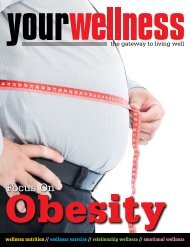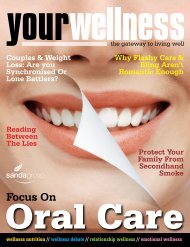Tech Mahindra_Issue_I_52 pages_3
You also want an ePaper? Increase the reach of your titles
YUMPU automatically turns print PDFs into web optimized ePapers that Google loves.
scientific<br />
50 wellness<br />
Can Psychobiotics Help Your Mood?<br />
yourwellness.com<br />
Scientists at the APC Microbiome Institute in Ireland may have<br />
found a way to counter low mood and erratic behaviour just<br />
by eating the right foods. Their study looked at including two<br />
prebiotics in the diet that encouraged the growth of certain<br />
gut bacteria that appears to have a direct impact on mood and<br />
behaviour. Prof John Cryan, with Prof Ted Dinan, tested two<br />
promising prebiotic candidates called Fos and Gos, found in a<br />
range of foods rich in fibre, to see if they could reduce chronic<br />
stress and anxiety. Says Prof Cryan, “We could see changes in<br />
different gene expression relevant to stress in the brain. We may<br />
have a whole new ‘psychobiotic’ way of managing disorders such<br />
as depression and anxiety disorders.”<br />
The research is at a very early stage and the team is hoping to<br />
set up a human trial as soon as possible to assess which prebiotic<br />
alone, or in combination, might provide the best results.<br />
Stress Increases<br />
Risk Of Excessive<br />
Drinking<br />
A study at the University of Pennsylvania has<br />
warned that stress could be a contributor to<br />
the downward spiral of alcoholism. The team<br />
found that periods of stress causes changes in<br />
the brain’s chemical makeup and can encourage<br />
an increase in drinking by altering the reward<br />
system. It changes what the body thinks it needs<br />
to survive, so stressed drinkers keep coming<br />
back for more.<br />
Their research found that signals in the brain<br />
released by stress involve the same neurological<br />
pathways as those stimulated through addictive<br />
substances. Misfiring neurons causes changes in<br />
the brain’s reward centre prompting excessive<br />
drinking.<br />
Understanding this brain chemistry could<br />
be helpful when it comes to treating people<br />
suffering from conditions such as post-traumatic<br />
stress disorder (PTSD). Says Professor Dr John<br />
Dani, “This line of research has implications for<br />
people with PTSD who have an increased risk<br />
for over-use of alcohol and drugs.”<br />
- Frederick Sanger<br />
Scientific research is one<br />
of the most exciting and<br />
rewarding of occupations.<br />
Stem Cells<br />
Could Create An<br />
Endless Blood<br />
Supply<br />
A UK-based research team has overcome<br />
a major barrier to creating red blood cells<br />
in the lab that could eventually ease blood<br />
shortages. The scientists infected stem cells<br />
with cervical cancer genes to create the first<br />
‘immortal’ adult red blood cells that could<br />
multiply an infinite number of times. As the<br />
cells mature, the nucleus is expelled giving the<br />
cells a signature dimpled shape. Jan Frayne<br />
and her team at the University of Bristol were<br />
able to filter these cells out, so the final batch<br />
did not contain active cancer genes. These<br />
stem cells could then be used to create Type O<br />
cells, known as the ‘universal donor’, as it can<br />
be used for nearly any patient’s blood group.<br />
There are other benefits of lab-grown blood<br />
too as it doesn’t contain other materials such as<br />
blood-clotting platelets or infections, so avoids<br />
problems for people with certain conditions, as<br />
well as the transmission of other diseases.<br />
The first human trials will begin in England<br />
later this year, however, right now, the mass<br />
production of blood using the method would<br />
be prohibitively expensive.

















